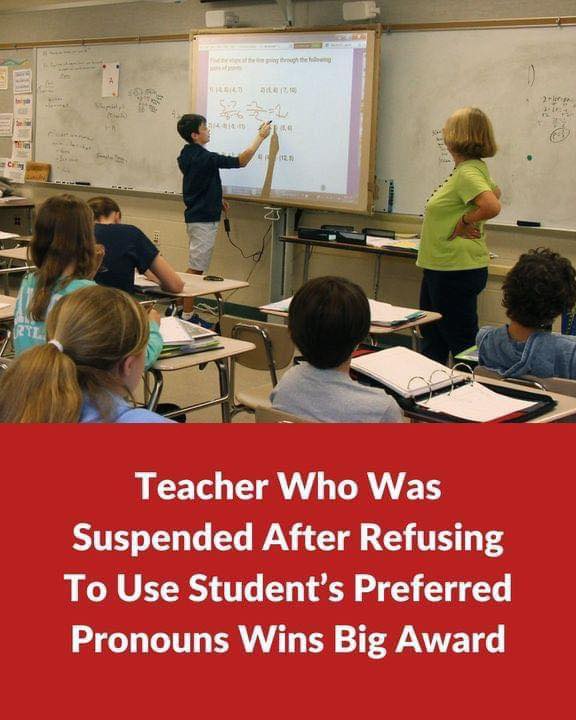The world has undeniably undergone significant changes in recent years. While some see these changes as a sign of progress, others feel they represent a troubling shift away from foundational values. One recent incident in Kansas highlights this debate, showcasing the challenges faced by individuals navigating conflicts between personal beliefs and institutional policies.
Pamela Ricard, a dedicated teacher in Geary County Schools, Kansas, found herself at the center of this contentious issue. Her decision to stand firm on her convictions ultimately led to a suspension. Ricard, a veteran educator, faced disciplinary action when she chose not to use the preferred pronouns of a student whose gender identity did not align with the student’s biological sex.

Ricard explained that her suspension stemmed from calling a biologically female student by the student’s legal last name instead of using the student’s preferred first name or pronouns. The situation unfolded when a school counselor informed Ricard about the student’s request to adopt a different name and gender identity. Despite the counselor’s explanation, Ricard decided to address the student as “Miss [legal/enrolled last name]” as a compromise. Ricard believed this approach respected both the student and her own beliefs. However, the school administration did not see it that way.
Ricard’s choice led to a three-day suspension for failing to adhere to the district’s policy, which required staff to use the names and pronouns that students identified with, regardless of their biological sex. This policy was intended to support inclusivity and affirm students’ gender identities, but for Ricard, it posed a direct conflict with her deeply held religious beliefs.
Ricard, a Christian, stated that her faith guided her actions. “Ms. Ricard is a Christian and holds sincere religious beliefs consistent with the traditional Christian and biblical understanding of the human person and biological sex,” her lawsuit explained. “Ms. Ricard believes that God created human beings as either male or female, that this sex is fixed in each person from the moment of conception, and that it cannot be changed, regardless of an individual person’s feelings, desires, or preferences.” For Ricard, addressing the student using pronouns or a name that aligned with a gender identity other than the student’s biological sex would have violated her conscience.
The legal battle that followed became a focal point for debates over religious freedom, education policies, and the rights of transgender individuals. Ricard filed a lawsuit against the school district, arguing that its policy infringed upon her First Amendment rights. She claimed that being forced to use pronouns or names inconsistent with a student’s biological sex amounted to compelled speech, which is protected under the Constitution.
In May, the federal court ruled in favor of Ricard, awarding her $95,000 in damages. This outcome marked a significant victory for individuals seeking to balance personal beliefs with professional obligations. The court’s decision not only awarded Ricard monetary compensation but also provided her with greater freedom to navigate similar situations in the future. Her attorney stated that Ricard would be allowed to communicate with parents about their children without violating her beliefs, as long as her communication mirrored the way she addressed students in the classroom.
Moreover, Ricard would not be required to use pronouns that conflicted with students’ biological sex. Additionally, the court ruled that school staff could not share students’ preferred names or pronouns with parents unless the students consented. This aspect of the ruling underscored a broader concern about parental rights and transparency in education, as well as the balance between protecting students’ privacy and ensuring parents are informed about significant aspects of their children’s lives.
The court’s rejection of the district’s policy sent a strong message about the limitations of institutional authority in matters where individual rights and freedoms are at stake. However, the ruling also sparked widespread debate. Supporters of Ricard viewed the decision as a triumph for religious liberty and free speech, arguing that individuals should not be forced to act against their deeply held beliefs in the workplace. Critics, on the other hand, expressed concerns that the ruling could undermine efforts to create inclusive environments for transgender students, potentially exposing them to discrimination and harm.
For Ricard, the court’s decision represented validation of her stance and a reaffirmation of her right to act in accordance with her conscience. Nevertheless, the broader implications of this case highlight the complexities of balancing personal convictions with institutional policies in a diverse and evolving society. Questions about how schools can effectively support all students while respecting the beliefs of their staff remain unresolved.
The school district has not made any public comments regarding the lawsuit or the court’s decision. This silence has left many wondering how the district will approach similar situations moving forward. Will there be changes to policies to address the court’s ruling? Or will the district continue to face legal challenges from staff who believe their rights are being infringed upon?
As debates over gender identity, religious freedom, and education policies continue to unfold across the nation, cases like Pamela Ricard’s are likely to become increasingly common. These situations force communities to confront challenging questions about the values that shape their institutions and the rights of individuals within them. For now, Ricard’s case serves as a pivotal moment in the ongoing conversation about how to navigate these issues in a way that respects both individual freedoms and the diverse needs of students in modern classrooms.





